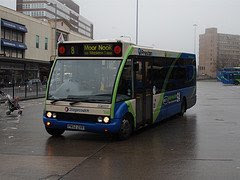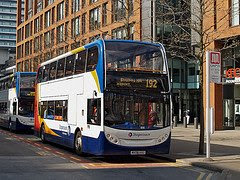
Picture the scene: a local bus company is rumoured to be looking to sell. The company that runs the out-of-town services decides to start its own operations over the most profitable sections of the local bus company's network, and they retaliate in kind. After a period of intense competition, the local bus company decides to sell up to the opposition, other potential buyers having been put off by the contested market. Sounds like an episode from the early days of bus deregulation, but in fact the denouement to this story occured earlier this year: Preston Bus selling up to rivals Stagecoach after eighteen months of attrition culminating in an inquiry by the traffic commissioner.
The local subsidiary has for this kind of behaviour, even predating its purchase by Stagecoach in 1989: Ribble introduced a rival minibus service against Barrow Borough Transport in 1986, the reduced revenue no doubt helping send that company into receivership. Further controversy was caused in 1994 (well into Stagecoach ownership) when Lancaster decided to sell its municipal bus company. Stagecoach feared the intervention of the OFT, so decided not to bid for the company. Instead, they offered to buy some of the assets from the council whilst registering competing bus services: interested buyers revalued their bids downwards so the council opted to liquidate the company for the best return: staff had to apply for new positions with Stagecoach. The MMC was not impressed, so imposed undertakings anyway.

Perhaps these situations were caused by the political landscape in Lancashire. Every proud township wanted to run their own bus company, and invariably did so. Ribble had to operate inter-urban or rural routes, in the gaps left by municipals. At deregulation, the company was vulnerable to competition within towns so took an aggressive stance – with no prisoners taken. There's no such justification for the most regrettable incident that Stagecoach was involved in: Darlington.
"It was the combination of Busways' actions in recruiting so many of Darlington Transport Company's drivers so quickly, registering services on all its routes and running free services which caused DTC's final collapse. We find these actions to be predatory, deplorable and against the public interest."
This was the conclusion of the MMC's investigation into the collapse of Darlington Transport Company in 1994, and a damning read it makes. Even Stagecoach admits that the negative impact of its actions in Darlington outweighed any financial gain it had made from operating buses there. Having failed to be named as preferred bidder in the sale of DTC by the local council, Stagecoach proclaimed its intention to start a competing service anyhow using its Newcastle based subsidiary Busways. Having lured a large number of drivers from DTC to jump ship with better pay rates and a signing on bonus, Stagecoach operated free services whilst waiting for the official go ahead for their new routes. This extinguished the prospect of a sale as preferred bidder Yorkshire Traction pulled out. Facing manpower problems and its revenue having been obliterated, DTC simply collapsed.
There's blame to go round, but the final sucker punch was undoubtedly delivered by Stagecoach. DTC was in a weak financial position, having faced competition on two seperate fronts from other bus companies over the past year, namely United and Your Bus. Stagecoach had put in a fair bid along with rival bus group Badgerline, but the council opted – quite reasonably – for the highest bid. The local workforce had little confidence in Yorkshire Traction's ability to turn the company's fortunes around, and relayed their willingness to defect to Stagecoach management. A sad tale that deprived the council of the opportunity to make a profit from the sale of its investment.

The company's founder and chairman is also a divisive figure. Brian Souter is one of the driving forces behind the building of the Stagecoach empire, building the company up from a couple of vehicles to nearly 7000 buses today. There's no disputing his success as a businessman: but in 2000 he made a questionable foray into the world of politics by helping fund a private poll in Scotland over the proposed repeal of Section 2A of the Local Government Act 1988 in Scotland, which forbade local authorities to "intentionally promote homosexuality". The move was criticised by politicians, with the Electoral Reform Society refusing to get involved and many questions raised over the validity of the result. Souter has since kept out of the limelight, but in 2007 he did donate half a million pounds to the SNP – who subsequently dropped a commitment to reregulate bus services from their manifesto. The party denies any direct link.
Having said all that...
The fact is that today the company is one of the better bus group PLCs, if not the best. I live in Manchester. A few minutes spent in the city centre will reveal a huge number of new double decker buses that the local subsidiary has invested in over the past few years. Even the older vehicles (excluding the low-cost Magic Bus operation) are invariably well turned-out, clean on the inside and positively gleaming on the outside: the fleet compares well against the competition. The drivers are generally smart and professional. Season tickets are good value, £11 for a weekly ticket valid on all services. Customer service is responsive.

Much the same is in evidence for other areas I've visited. You can question the methods, rightly so at times, but the end result in Preston sees a combined network and fares that are simpler. The same can be said of Barrow and Lancaster. Stagecoach is credited with the "Kickstart" program, whereby a few years of Government subsidy leads to service improvements that will hopefully sustain themselves commercially in the long term. They want to expand the market, and where things aren't working out then they will cut their losses and allow other companies to have a go – such as in Burnley and (belatedly) even Darlington.
The Stagecoach Group has had a controversial history, particularly in its early years, but it seems to me that now they are well placed within the current system to continue to invest, innovate and improve their bus services.
Image credits: ian.simpson, nightfire620 (with permission) and Ingy the Wingy on Flickr
No comments:
Post a Comment